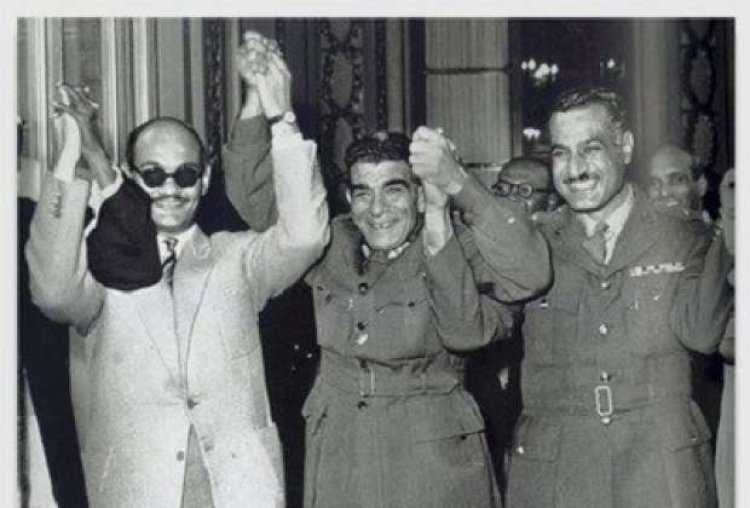The Free Officers: 71 years since the July 23 Revolution

Translated by: Aya Barakatt
From the cage to the vastness of space, Egyptians wrote down history in gold letters, doing more and more: a desire to get rid of injustice and take to the sky of freedom with boundless will and determination; an authentic people that is not subordinate to anyone; one word, one hand always in crisis.
Major revolutions in the history of humanity and peoples played an important role in changing the existing system that controls political and social life, whose change required another system that achieves the desires and aspirations of the people. This change is a revolution or a popular movement through which the desired goals are achieved. This revolution or movement shall be fully supported by the strong will of its people.
The beginning of the transformation in the lives of the Egyptian people was the revolution of July 23, 1952, when the Free Officers swore to rid the country of the existing rule and establish democratic rule.
The movement of Free officers
It is an organisation carried out by the Free Officers that took place on July 23, 1952, and they called themselves "The Free Officers Organisation." Before that, it was called the "Army Movement." Their ages did not exceed thirty-five years, except for some of them. The aim of the organisation was not to create connections or public influence, and this distinguished them from other military movements.
Before the revolution of July 23, 1952, Egypt had reached a great degree of political tension. As a result of the spread of corruption and the deterioration of conditions, In addition to the domination of feudalism and the British occupation, these conditions were the motive for the revolution of July 23, 1952.
At dawn on July 23, 1952, the army, led by the Free Officers, was able to control vital areas and besiege strategic points such as the royal palaces, the Ministry of War, and the radio building. The king and his government were at that time in the city of Alexandria.
Anwar Sadat arrived at the radio building at a quarter past seven in the morning. To broadcast the first statement drawn up by Major General Muhammad Najeeb, which reads as follows: "Egypt went through a difficult period in its recent history of bribery, corruption, and instability of government. All of these factors had a great impact on the army, and the bribe-takers and malicious people caused our defeat in the Palestine war. As for the period after this war, the factors of corruption combined, and the traitors conspired against the army and took control of it, either ignorant or corrupt. God is the Grantor of Success.".
Egyptians woke up at dawn on July 23 to the Free Officers' revolution against the monarchy. The officers carried out an armed coup that did not shed blood, and they succeeded in controlling the situation. This forced the king to abdicate, and he was exiled to Italy on July 26. As a result, the monarchy was abolished, and the system of government was transformed into a republican system.
The Egyptian people showed their support for the army, and all its groups and sects came out to support the goals of the revolution. Thus, the revolution adopted its legitimacy from the people, and after their support, the Egyptian people followed the path of the revolution, whatever the difficulties and whatever the sacrifices. The revolution announced its principles as eliminating colonialism, facing feudal rule, eliminating monopolies, establishing social justice, and facing conspiracies that targeted the army.
The Egyptian situation changed radically after the revolution, as the revolution supported the class that suffered from injustice and denial of social justice. The formation of the Free Officers did not represent a single political trend but rather included various trends. This led to a major shift in the Egyptian situation; the revolution was associated in the minds of Egyptians with the image of the late Gamal Abdel Nasser, who became a visible symbol of liberation movements in the face of the occupation, and the image has continued like this until this day.
Egypt achieved political independence by eliminating the monarchy and declaring a republic. The land of Egypt was liberated from the coloniser who robbed the people of their rights, and the revolution was directed towards achieving economic independence by getting rid of monopolies, and thus it was able to achieve the principle of social justice and improve its cultural and educational situation.
Egypt, in the aftermath of the July 23 revolution, expanded its role greatly in Africa and the Arab region, and the liberation movements that were launched in its wake received financial and moral support from Egypt. As Cairo succeeded in supporting the liberation movements in Yemen and Algeria, their case was presented in the United Nations and international forums, so the Voice of the Arabs radio station represented media support. To serve the revolution in Algeria, a secret private radio station was established. To broadcast the data, the Egyptian press was also supportive of the Algerian revolution.
The revolution affirmed to the Arab nation from the Ocean to the Gulf that the power of Arabs was in their unity, combined with one history, one common language, and one destiny, thus setting the most remarkable examples: The Egyptian army's bias towards the hopes and aspirations of the people in life. The support provided by the revolution under the leadership of Gamal Abdel Nasser to liberation movements, whether in the Arab or African world, and its effective role in the emergence of the Organisation of African Unity gave Egypt an international, Asian, and African status.
